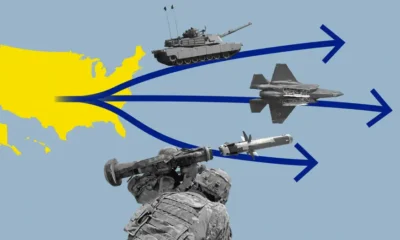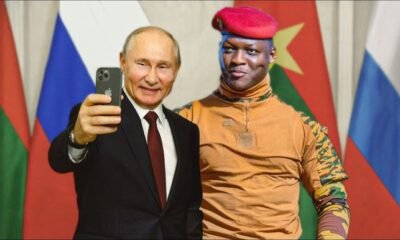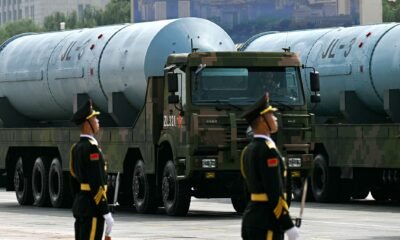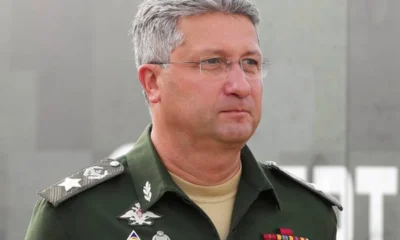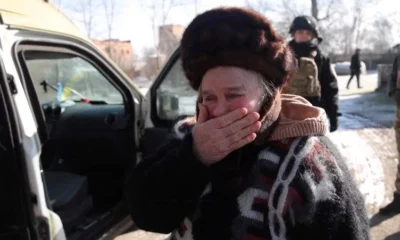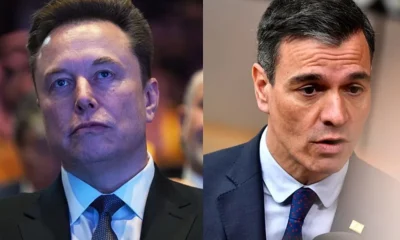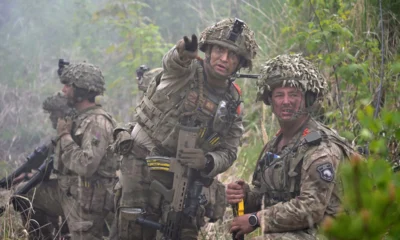Russia-Ukraine War
FBI Sounds Alarm Over Potential Coordinated Attack on US Homeland
The recent surge in confidence among supporters of the Islamic State terror group, coupled with online threats against Europe and a deadly attack on a concert hall in Russia, has raised concerns among security officials in the United States. While law enforcement agencies have long been vigilant about the potential for individuals or small groups inspired by global terror plots to carry out attacks in the U.S., FBI Director Christopher Wray’s recent warning to lawmakers suggests a heightened level of concern.
Wray highlighted the possibility of a coordinated attack within the U.S., similar to the ISIS-K attack at the Russia concert hall. This warning comes in the wake of threats posted by media outlets linked to the Islamic State, calling for attacks on stadiums hosting Champions League soccer matches in Madrid, London, and Paris. The attack on the Crocus City concert hall outside Moscow, which claimed 145 lives, serves as a grim reminder of the group’s deadly capabilities.
While there is no specific intelligence indicating an imminent threat to the United States, the FBI’s caution signals a potential shift in thinking regarding the reach of ISIS and its affiliates. Despite assertions from the Department of Homeland Security that there is no credible intelligence suggesting an immediate threat to the U.S., concerns persist about the group’s ability to carry out attacks on American soil.
National Counterterrorism Center Director Christine Abizaid noted that ISIS-Khorasan, the group’s Afghan affiliate, retains the capability to target U.S. and Western interests abroad. General Michael “Erik” Kurilla, commander of U.S. forces in the Middle East and South Asia, echoed these concerns, emphasizing the group’s potential to strike with little warning.
In response to the heightened threat environment, the Department of Homeland Security has urged Americans to remain vigilant and report any suspicious activity to law enforcement. While the immediate risk may not be quantifiable, the specter of coordinated terror attacks on U.S. soil underscores the ongoing challenges faced by security agencies in combating the global reach of extremist ideologies.
Russia-Ukraine War
Russian General Hospitalized After Shooting in Moscow
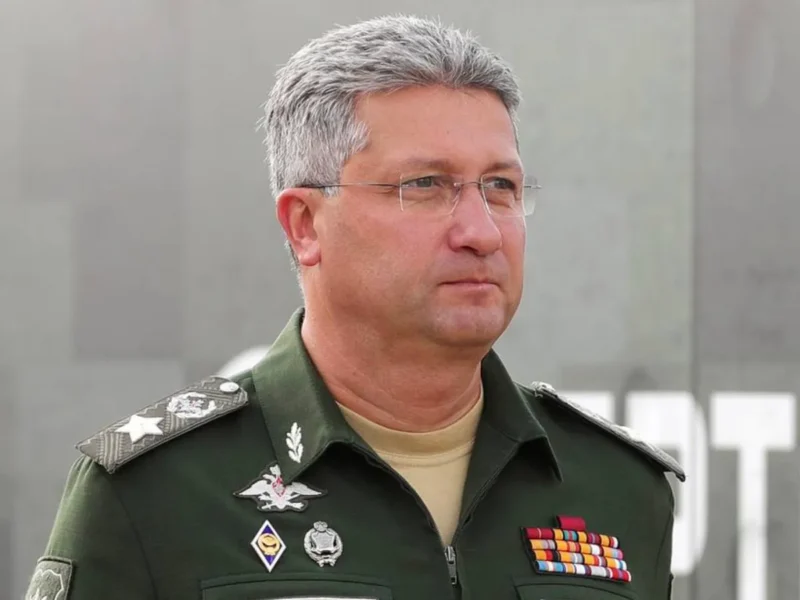
MOSCOW — A senior Russian military intelligence official was hospitalized Friday after being shot outside an apartment building in Moscow, authorities said.
Russia’s Investigative Committee said Vladimir Alekseyev, deputy chief of Russia’s military intelligence agency (GRU), was targeted when an unidentified assailant fired several shots at him. The incident occurred near his residence, according to a statement by committee spokesperson Svetlana Petrenko.
Officials did not immediately disclose Alekseyev’s medical condition or provide details on the suspect or motive. An investigation is under way.
Alekseyev has served as deputy head of Russian military intelligence since 2011 and previously oversaw intelligence operations during Russia’s intervention in the Syrian civil war.
The shooting adds to a series of attacks on senior Russian military figures since the start of the war in Ukraine. In December, Lieutenant General Fanil Sarvarov was killed by a bomb planted under his car. In April 2025, Lt. Gen. Yaroslav Moskalik died in a car bombing near his apartment outside Moscow.
Russian authorities have frequently blamed Ukraine for such attacks. In some cases, Ukrainian military intelligence has publicly claimed responsibility, including the December 2024 killing of Igor Kirillov, head of the Russian army’s chemical weapons division, who was killed by a bomb hidden on an electric scooter outside his home.
Friday’s attack is likely to intensify security concerns within Russia’s military and intelligence leadership as the conflict with Ukraine continues.
Russia-Ukraine War
Civilians Abandon Southeast Ukraine as Russia Pushes Forward
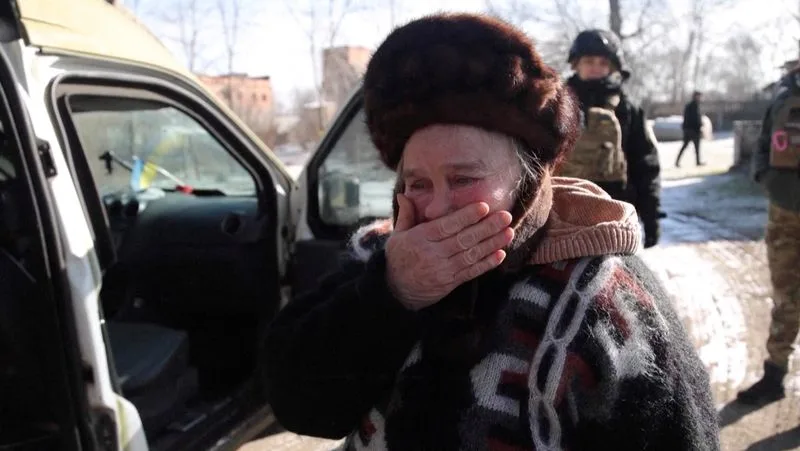
Buses stop running. Villages fall silent. As Russia inches closer, families in southeast Ukraine are leaving everything behind to survive.
TAVRIÍSKE, Ukraine — In recent weeks, buses have stopped running from the village of Tavriiske to the regional hub of Zaporizhzhia, about 50 kilometers away. As fighting creeps closer, the village is steadily emptying, its remaining residents forced to confront a stark choice: stay and risk death, or flee with little more than what they can carry.
Maryna Vyshnevska, 35, gathered her five children and a handful of belongings before boarding a police evacuation bus — one of the last lifelines out. “We thought they would be driven back and all this would stop,” she said, referring to Russian forces. “But when we realised it would only get worse and worse, it was better to leave.”
Her departure comes as Russia and Ukraine begin a new round of U.S.-brokered peace talks in Abu Dhabi. On the ground, however, Russia’s military momentum continues. Over recent months, Russian troops have ground forward along multiple sections of the 1,200-kilometer front line, tightening pressure on Ukraine’s southeastern regions.
While Moscow’s forces push toward the heavily fortified cities of the eastern Donetsk region, they are also advancing toward Zaporizhzhia — the capital of one of four Ukrainian regions Russia has unilaterally claimed, despite only partially occupying the territory.
Ukrainian military officials say fighting has intensified in recent weeks, particularly around the town of Huliaipole, roughly 40 kilometers east of Tavriiske. The villages in this area sit in a dangerous frontline bulge, with Russian forces positioned on three sides.
Residents who spoke to Reuters during a recent visit described living under constant threat from drones, artillery and air-dropped bombs. Anti-drone netting now shrouds the main regional road as police teams and volunteers patrol the area, evacuating civilians under fire. Local authorities say almost no families remain in the villages surrounding Tavriiske.
“Every day, every week, we see more destruction and a greater risk of entering towns like these,” said Vlad Makhovskyi, 51, a volunteer wearing tactical gear as he helped evacuate residents. At one stop, two men carried an elderly woman from her damaged home using a bright pink bedsheet as an improvised stretcher.
For those leaving, the emotional toll is heavy. Nataliia Fedorenko, 66, broke down in tears as she described the fear of remaining behind as fighting worsened. “It’s scary. Nobody wants to die,” she said quietly before evacuating. “I know I don’t have much time left, but this kind of death…?”
As Russia presses forward and diplomacy struggles to keep pace with events on the battlefield, villages like Tavriiske are becoming ghost towns — stark symbols of a war that continues to consume civilian life in its path.
Russia-Ukraine War
Moscow: Any Western Forces in Ukraine Will Be Hit
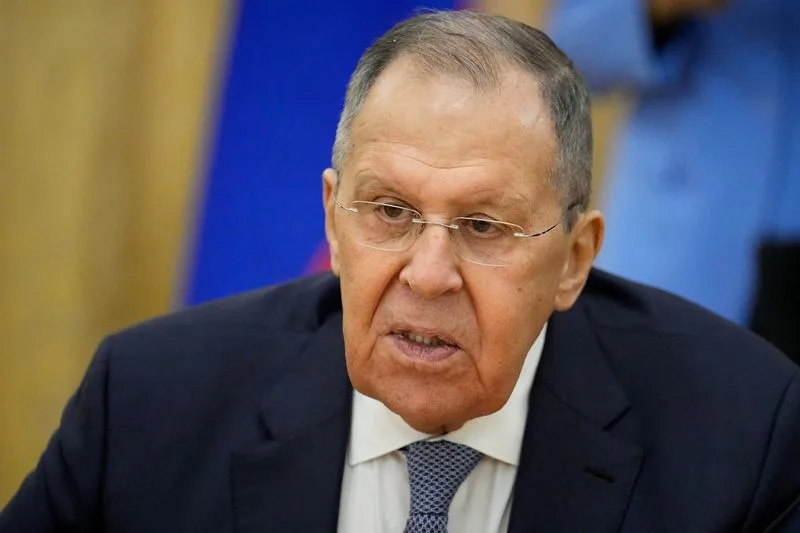
As diplomacy inches forward, Russia is making one thing brutally clear: foreign boots in Ukraine cross a line.
Russia has issued one of its starkest warnings yet to the West, declaring that any foreign military forces or infrastructure deployed in Ukraine would be treated as “legitimate targets” by the Russian Armed Forces—a statement that sharply raises the stakes as talks aimed at ending the war continue.
In comments released Monday, the Russian Foreign Ministry cited Foreign Minister Sergei Lavrov as saying that the presence of Western troops, bases, or logistics facilities in Ukraine would constitute direct foreign intervention and pose an unacceptable threat to Russia’s security.
“The deployment of military units, facilities, warehouses, and other infrastructure of Western countries in Ukraine is unacceptable to us,” the ministry said. “All foreign military contingents, including German ones, if deployed in Ukraine, will become legitimate targets.”
The warning comes as several Western governments quietly debate whether some form of foreign military presence could help guarantee a future peace settlement. Moscow’s response suggests it intends to foreclose that option entirely—by force if necessary.
The statement also revealed a notable contrast in tone toward Washington. The Foreign Ministry praised U.S. President Donald Trump for what it called “purposeful efforts” to resolve the conflict and for recognizing what Moscow describes as the war’s “root causes,” particularly NATO’s eastward expansion and its overtures to Ukraine.
Lavrov, the ministry said, views Trump as “one of the few Western politicians” willing to engage Moscow without what Russia labels “meaningless and destructive preconditions.” The message underscores a broader Russian strategy: separating Washington from its European allies by portraying the U.S. president as pragmatic while casting European security initiatives as escalatory.
Diplomatic efforts are nonetheless continuing. The United States is spearheading talks to end the conflict, with a second round of three-sided discussions involving Russian and Ukrainian representatives expected this week in the United Arab Emirates.
Yet the core obstacle remains unresolved. Russia continues to demand that Ukraine cede the entirety of the Donbas region, including areas Moscow has not captured militarily. Kyiv has rejected those demands outright, insisting that internationally recognized territory cannot be traded away under pressure.
Russia’s categorical rejection of any Western troop presence highlights a deeper reality: even if a ceasefire or peace framework emerges, Moscow intends to dictate the security architecture that follows. From its perspective, peace enforced by NATO-adjacent forces would be indistinguishable from defeat.
The warning also places European capitals in a bind. Any discussion of postwar security guarantees involving physical deployments now carries the explicit risk of direct confrontation with Russia. What might be framed in the West as stabilization could, in Moscow’s calculus, justify escalation.
In effect, Russia is drawing a hard red line before negotiations even conclude. The message is simple and chilling: diplomacy may decide borders, but force will decide who is allowed to stand on them.
Russia-Ukraine War
Peace in Ukraine, Instability in Europe? Estonia Sounds the Alarm
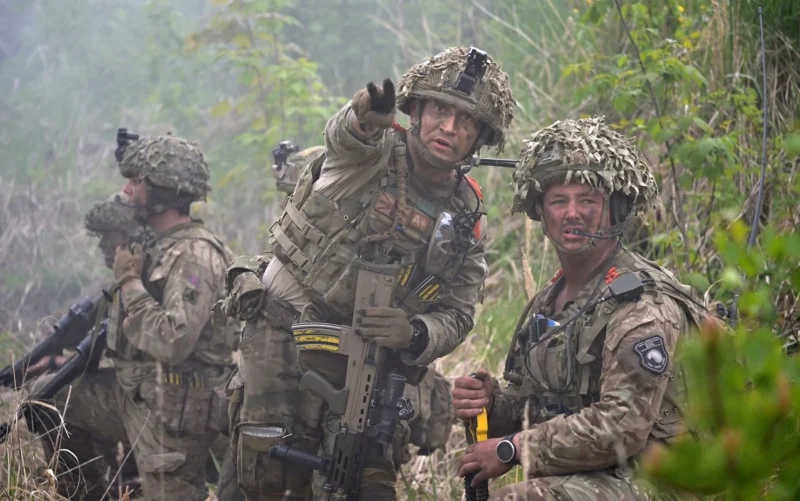
The War After the War: How Russia’s Veterans Could Become Europe’s Problem.
European governments are facing renewed warnings that a potential ceasefire in Ukraine could trigger a new phase of security instability across the continent, as Russia seeks to redirect former combatants into hybrid operations inside the European Union.
Estonia’s Foreign Minister Margus Tsahkna said Russia could send hundreds of thousands of ex-soldiers into Europe after any halt in fighting, using them to carry out sabotage, criminal activity and destabilization efforts. Speaking on the sidelines of meetings in Brussels, Tsahkna described the threat as urgent and unprecedented, urging the EU to act before the war formally ends.
“We have close to one million combatants in Russia right now,” Tsahkna said, warning that many of them were recruited from prisons and had violent criminal backgrounds. He argued that Moscow would not want such individuals returning home and could instead “weaponize” them as part of a broader hybrid campaign against Europe.
Estonia has proposed a blanket ban preventing Russian soldiers who fought in Ukraine from entering the EU’s Schengen free-travel zone, which covers 29 countries. The proposal would also restrict work visas and residence permits for former combatants. Tsahkna said several EU partners had responded positively to the idea, and political guidance could be issued at upcoming European summits.
The warning reflects growing concern that Vladimir Putin could use any pause in the Ukraine war to intensify pressure on Europe through non-military means. European security services have already linked Moscow or its proxies to a rise in sabotage, arson and covert operations since Russia’s 2022 invasion of Ukraine, though the Kremlin denies responsibility.
Estonian intelligence assessments suggest that up to 180,000 convicted prisoners were recruited directly from Russian penal colonies to fight in Ukraine. According to officials, crime rates in Russia have surged as some veterans returned home, reinforcing fears that others could be directed abroad.
“These individuals are perfect for hybrid operations,” Tsahkna said, citing their experience with violence and their vulnerability to recruitment by Russian security services.
The concerns extend beyond Estonia. Several EU countries and the United Kingdom have reported an increase in suspected Russian-linked incidents, including attacks on infrastructure and politically sensitive targets. Analysts say such actions are designed to undermine public confidence and strain internal security systems without triggering a conventional military response.
While NATO remains focused on deterring direct military aggression from Russia, officials acknowledge that hybrid threats fall largely outside traditional defense planning. The prospect of large numbers of former fighters moving freely across Europe has raised questions about the bloc’s preparedness for post-war risks.
Tsahkna said Estonia has already imposed entry bans on hundreds of suspected ex-combatants and has begun sharing intelligence with partners. He called on non-Schengen countries, including the UK, to coordinate closely with the EU to prevent potential security gaps.
“We need to do this now,” he said. “Europe is not ready for peace if peace means a new kind of insecurity.”
EU officials have not yet announced a collective decision, but discussions are expected to intensify as diplomatic efforts toward a Ukraine settlement continue.
Russia-Ukraine War
Kadyrov Urges Russia to Reject Ukraine Talks and Fight to the Finish
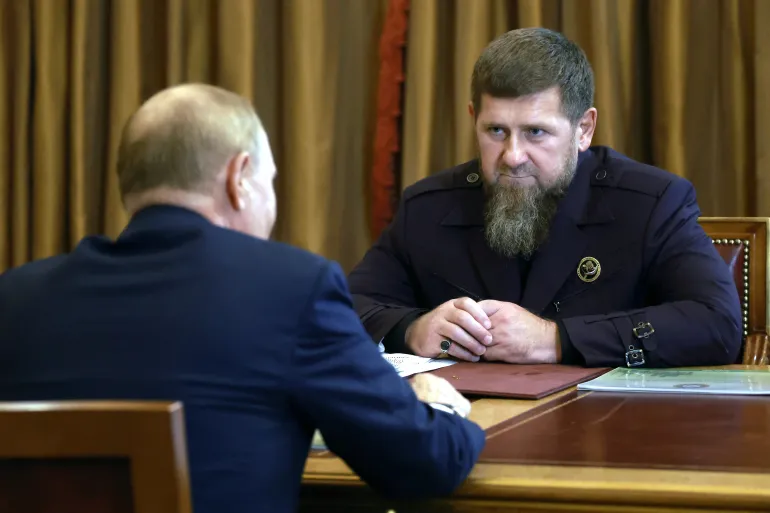
Ramzan Kadyrov Rejects Ukraine Peace Talks, Urges Russia to Fight War to the End.
Ramzan Kadyrov’s rejection of negotiations on Ukraine is less a statement of policy than a signal of pressure.
Speaking at the Kremlin while President Vladimir Putin met the United Arab Emirates’ president, the Chechen leader cast himself as the uncompromising voice of Russia’s war camp. He argued that the conflict should be fought to its conclusion and dismissed diplomacy outright.
Kadyrov’s stance reflects a strand of opinion among Russian hardliners who believe time favors Moscow. After years of grinding warfare, they see signs of Ukrainian fatigue, wavering Western unity, and shifting political winds in Washington as reasons to press on rather than pause.
But Kadyrov does not make strategy. Putin does.
The Kremlin’s line remains deliberately dual-track. Officials say Russia prefers to secure its objectives through diplomacy, yet insists those objectives will be achieved by force if talks fail. That formulation keeps every option open while allowing Moscow to test diplomatic channels without conceding leverage on the battlefield.
Kadyrov’s intervention serves a different purpose. It reminds both domestic audiences and foreign negotiators that any Russian leader contemplating compromise faces resistance from powerful hawks who frame the war as existential. By publicly opposing talks, Kadyrov narrows the political space for early concessions and strengthens the perception that only decisive outcomes will satisfy Russia’s most loyal war constituencies.
His remarks also land at a sensitive moment. Renewed diplomatic efforts to end the war are gaining attention, and regional actors in the Gulf are increasingly active as intermediaries. Delivering his message alongside a high-profile meeting with an Emirati leader underscores the contrast between Moscow’s openness to dialogue and the hardline camp’s insistence on victory.
In practical terms, Kadyrov’s position is unlikely to change the Kremlin’s calculus on its own. Putin has consistently balanced hawkish rhetoric with tactical flexibility, escalating when advantageous and exploring talks when useful. Yet voices like Kadyrov’s matter because they define the outer edge of acceptable debate inside Russia’s power structure.
For Ukraine and its partners, the message is sobering. Even if diplomatic channels expand, influential figures around Putin are preparing the public for a long war. Any negotiation that appears to fall short of Russia’s maximal aims will face loud opposition from those who believe momentum is on Moscow’s side.
In that sense, Kadyrov’s comments are less about today’s battlefield than tomorrow’s bargaining table. They signal that if talks do come, they will unfold under the shadow of a domestic constituency that demands an end through force, not compromise.
The decision on when to stop still rests with Putin. Kadyrov’s role is to make stopping harder.
Russia-Ukraine War
Why Ukraine Peace Talks Are Stuck on One Brutal Question
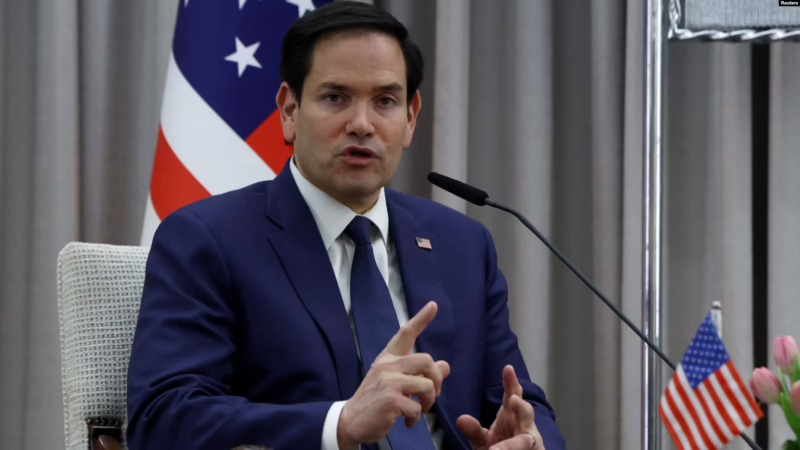
Peace now hinges on a single word: Donetsk. And no one wants to say it out loud.
The battle over Donetsk has emerged as the central fault line in U.S.-mediated efforts to end Russia’s war in Ukraine, highlighting how close — and how far — diplomacy remains from a breakthrough.
Speaking Wednesday before the U.S. Senate Foreign Relations Committee, Marco Rubio said active negotiations are under way to reconcile the territorial dispute over Donetsk, calling it the “very difficult” issue that continues to block a peace agreement.
“We’ve narrowed down the issue set to one central one,” Rubio told lawmakers. “It’s still a bridge we have to cross. It’s still a gap — and it will probably be a very difficult one.”
That gap is geography — and sovereignty.
Donetsk is part of Ukraine’s Donbas region, where Russian forces currently control roughly 90% of the territory. President Vladimir Putin has made clear that Moscow demands the entirety of Donbas, insisting Russia will take it by force unless Kyiv formally cedes what remains under Ukrainian control — around 5,000 square kilometers.
Ukraine has drawn a firm line in response. Kyiv has repeatedly said it will not “gift” Russia territory it has failed to capture on the battlefield, a position backed by Ukrainian public opinion, where polls show little appetite for territorial concessions. Most of the international community continues to recognize Donetsk as sovereign Ukrainian territory, despite Moscow’s claim that it belongs to Russia’s so-called “historical lands.”
The dispute has become the single most combustible issue in the talks.
Last weekend’s negotiations in Abu Dhabi — which included rare face-to-face contact between Russian and Ukrainian officials — ended without a deal, though both sides signaled openness to further dialogue. Follow-up talks are expected next Sunday, according to U.S. officials.
Rubio said the United States may participate directly in the next round, but confirmed that President Donald Trump’s senior envoys, Steve Witkoff and Jared Kushner, will not attend. Their absence suggests Washington is recalibrating its role as negotiations move from confidence-building to decisions with irreversible consequences.
Behind the scenes, pressure on Kyiv is intensifying. The Trump administration has made clear it wants the war — Europe’s deadliest conflict since World War II — brought to an end, even if that requires politically painful compromises. The Financial Times reported this week that Washington told Ukraine U.S. security guarantees would only follow after Kyiv signs a peace deal with Russia.
Rubio did little to contradict that framing. Asked whether security guarantees had been agreed, he said they could be considered settled “from our side of the equation,” but emphasized that they would only come into force after the war ends — and that Russia remains a decisive variable.
That sequencing matters. For Ukraine, security guarantees are not a bonus but the foundation of any sustainable peace. For Russia, territory is the price of ending the war. And for Washington, Donetsk has become the test case for whether diplomacy can square irreconcilable narratives of victory, legitimacy, and loss.
The talks are no longer about abstract principles. They are about maps.
And as Rubio’s remarks made clear, the closer negotiators get to peace, the sharper — and more dangerous — the final argument becomes.
Russia-Ukraine War
Washington Raises the Price of Protection for Ukraine

Ukraine wants guarantees. The U.S. wants a deal. Between them lies the future of Europe’s war map.
The United States has privately told Ukraine that signing a peace agreement with Russia is a prerequisite for receiving U.S. security guarantees, according to a source familiar with internal discussions, underscoring a pivotal shift in Washington’s approach to ending Europe’s largest war in decades.
For Kyiv, U.S. security guarantees are the central pillar of any settlement aimed at ending Russia’s four-year invasion. Without them, Ukrainian officials fear a ceasefire would merely pause the conflict rather than secure lasting peace. But Washington’s message, as reported by Reuters, suggests that those guarantees will not come in advance of a political deal.
The United States recently brokered indirect talks between Ukrainian and Russian envoys in Abu Dhabi, discussions U.S. officials described as making progress. Negotiators are expected to meet again on Sunday, with potential participation from American representatives.
The Financial Times reported that the Trump administration has signaled to Kyiv that U.S. guarantees would be conditional on Ukraine agreeing to a peace deal that could involve ceding the Donbas region to Russia. However, the Reuters source pushed back on that interpretation, saying Washington is not dictating the contents of any agreement and that it is misleading to suggest the U.S. is forcing territorial concessions.
Still, the leverage is unmistakable.
Ukrainian President Volodymyr Zelenskiy said Sunday that a U.S. document outlining security guarantees was “100% ready,” and that Kyiv is now waiting for a time and place to sign it. Yet senior Ukrainian officials privately express frustration, telling the Financial Times that the United States “stops each time the security guarantees can be signed,” fueling uncertainty about Washington’s ultimate commitment.
Zelenskiy has repeatedly insisted that Ukraine’s territorial integrity must be preserved in any peace settlement, a position that clashes with Moscow’s stance. On Monday, the Kremlin reiterated that territory remains a fundamental issue in any agreement, according to Russia’s state news agency.
U.S. envoys Steve Witkoff and Jared Kushner emerged from the Abu Dhabi talks optimistic that a deal could be reached soon. But optimism in Washington contrasts with anxiety in Kyiv, where officials fear that peace may come at the cost of strategic ambiguity — or worse, enforced compromise.
The message from Washington marks a recalibration rather than a withdrawal: the U.S. remains engaged, but it is no longer offering security guarantees as a blank check. Instead, it is tying protection to political closure.
For Ukraine, the dilemma is stark. Accepting this framework could accelerate an end to the war but risks locking in losses. Rejecting it could preserve principle — while leaving Kyiv exposed.
As talks resume, the question is no longer whether peace is possible, but on whose terms it will be secured — and how much security will truly be guaranteed once the ink dries.
Russia-Ukraine War
Territory Takes Center Stage as Russia and Ukraine Enter High-Stakes UAE Talks
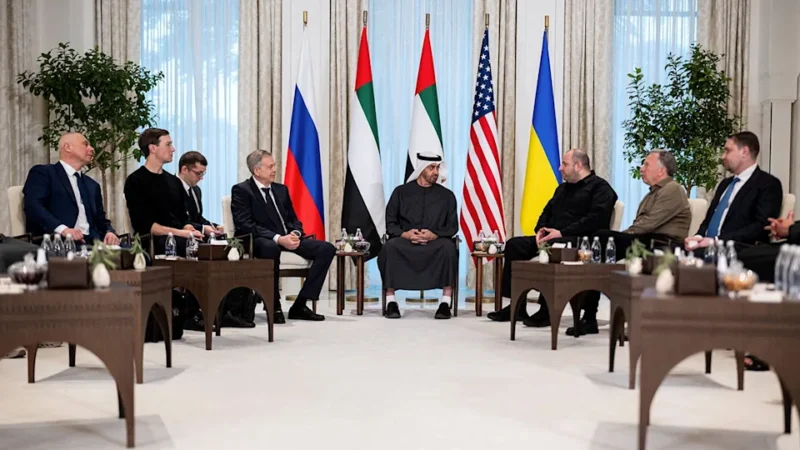
For the first time since 2022, Russia, Ukraine, and the United States are sitting at the same table — not to exchange threats, but to confront the question both sides have tried to avoid: territory.
The trilateral talks in Abu Dhabi mark a decisive shift in the nearly four-year war. Until now, diplomacy circled around ceasefires, sanctions, prisoners, and weapons. Now it faces the core dispute that has defined the conflict from the start: who controls the Donbas — and at what price.
The symbolism is as important as the substance. These talks follow President Zelenskyy’s meeting with Donald Trump in Davos and Vladimir Putin’s late-night session in Moscow with U.S. envoy Steve Witkoff and Trump’s son-in-law Jared Kushner. In diplomatic terms, this is not coincidence — it is choreography. Washington is repositioning itself not just as a supporter of Kyiv, but as the broker of a geopolitical reckoning.
At the heart of the negotiations lies Donetsk, where Russia is demanding Ukraine surrender the 20 percent it still holds. Zelenskyy has publicly rejected land concessions for nearly four years, framing them as a betrayal of national survival. Yet the very fact that Ukrainian envoys are now discussing Donbas in Abu Dhabi signals a strategic recalibration, driven less by ideology than by exhaustion.
That exhaustion is not abstract. As diplomats gather in climate-controlled conference rooms, Ukraine is enduring sub-zero temperatures after Russian missile strikes crippled its power grid. The head of Ukraine’s largest private energy firm now warns of an approaching “humanitarian catastrophe.” In war, diplomacy moves fastest when civilians freeze.
Putin enters the talks with momentum on the battlefield and clarity on his red lines. Territory is non-negotiable, and Moscow has framed any settlement around formal recognition of Russian control over occupied regions. Zelenskyy enters with international legitimacy, but narrowing strategic space — pressured by war fatigue in Europe, political recalibration in Washington, and a looming fourth anniversary of invasion.
Trump, for his part, is repositioning the narrative. Where previous administrations emphasized endurance, Trump emphasizes closure. “Now, I think they both want to make a deal,” he said aboard Air Force One — not as a prediction, but as a framing device. If peace happens, Trump claims authorship. If it fails, blame disperses across Kyiv and Moscow.
What makes these talks especially volatile is that territory is not merely land. It is identity, legitimacy, and historical memory. Any compromise risks destabilizing Zelenskyy domestically, while anything short of territorial recognition risks undermining Putin’s war narrative.
Yet the alternative is a war without horizon.
Abu Dhabi is not hosting a peace agreement. It is hosting the first real test of whether war can be politically ended, not just militarily endured.
And once territory is on the table, there is no returning to comfortable ambiguity. Every future battlefield move, every sanction, every diplomatic gesture will now be measured against a single question: who is preparing for peace — and who is preparing to win before peace arrives?
The Donbas is no longer just a front line. It is now the fulcrum of Europe’s most consequential negotiation.
-

 Interagency Assessment2 months ago
Interagency Assessment2 months agoTOP SECRET SHIFT: U.S. MILITARY ORDERED INTO SOMALILAND BY LAW
-

 Somaliland4 months ago
Somaliland4 months agoSomaliland Recognition: US, UK, Israel, and Gulf Bloc Poised for Historic Shift
-

 Minnesota1 month ago
Minnesota1 month agoFraud Allegations Close In on Somalia’s Top Diplomats
-

 Middle East2 months ago
Middle East2 months agoSaudi Arabia vs. UAE: How The Gulf Rivalry is Heating Up
-

 American Somali3 months ago
American Somali3 months agoWhy Frey Won a Significant Share of the Somali Vote Against a Somali Opponent
-

 Middle East2 months ago
Middle East2 months agoTurkey’s Syria Radar Plan Triggers Israeli Red Lines
-
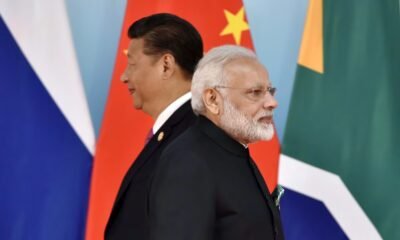
 Editor's Pick1 month ago
Editor's Pick1 month agoWhy India Is Poised to Become the Next Major Power to Recognize Somaliland
-

 The Million-Follower Exile2 months ago
The Million-Follower Exile2 months agoWhy America Deported Its Most Famous Somali TikTok Star And Who Paid The Price








